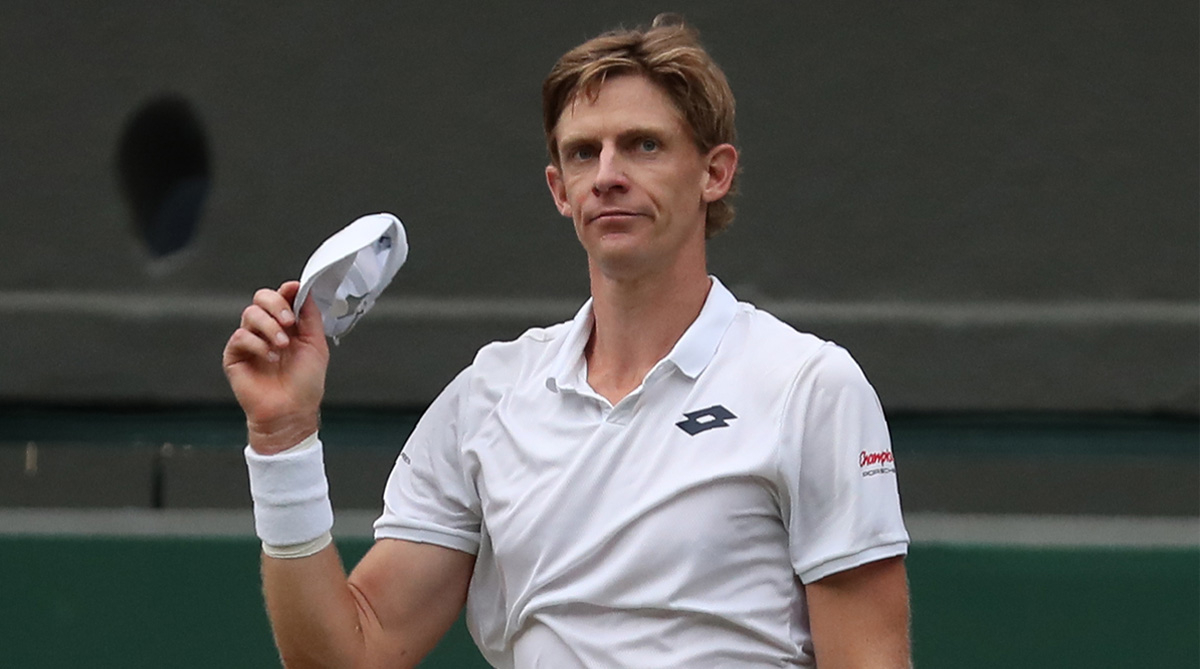Kevin Anderson won the longest Centre Court match in history and earned a chance to try to collect his first Grand Slam championship, edging John Isner 7-6 (6), 6-7 (5), 6-7 (9), 6-4, 26-24 at Wimbledon in a marathon between two big servers that lasted more than six-and-a-half hours.
The fifth set alone lasted nearly 3 hours as the semifinal became a test of endurance more than skill. Anderson finally earned the must-have, go-ahead service break with the help of a point in which the right-hander tumbled to his backside, scrambled back to his feet and hit a shot lefty.
Advertisement
Only one match at the All England Club has been longer: Isner’s 2010 first-round victory over Nicolas Mahut, which went more than 11 hours over three days and finished 70-68 in the fifth. That was played over on Court 18, which now bears a plaque commemorating the record-setter.
Anderson, a 32-year-old from South Africa, eliminated eight-time Wimbledon champion Roger Federer in a 13-11 fifth set in the quarterfinals on Wednesday. Between that and the energy-sapper against Isner yesterday, it’s hard to imagine how the No. 8 seed Anderson will have much left for Sunday’s final, his second at a major.
Anderson was the runner-up to Rafael Nadal at last year’s US Open. There could be a rematch now. Anderson’s opponent for the title will be Nadal or Novak Djokovic, who did not set foot on Centre Court until just before 8 pm last evening, after waiting around all day. Because it was so late, and with rain forecast, the All England Club shut the retractable roof above the main stadium before the second semifinal.
The expectation was that the first semifinal would be a tight contest filled with tiebreakers and that’s precisely what it was. Wimbledon doesn’t use tiebreakers in the fifth set for men, or third set for women, so there’s nothing to prevent a match from going on and on and on and that’s precisely what Isner and Anderson did, often thanks to one ho-hum hold after another. At one point in the fifth set, a spectator shouted, “Come on, guys! We want to see Rafa!”
Anderson and Isner go way back, to their days when they played in college, Isner at Georgia, Anderson at Illinois. Not much difference between them. Both are tall Isner’s 6-foot-10, Anderson 6-foot-8 and lanky. Both wore a white baseball hat, Anderson with the brim in front, Isner with his turned his backward.
In the pros, Isner’s generally gotten the better of things, leading their head-to-head series at 8-3 entering this semifinal. But this one was as competitive and close as can be.
Two hours and two sets in, they were even at one apiece, each via tiebreaker, with zero service breaks, only the very occasional extended point and aces by the dozen.
There was not a ton of intrigue or momentum shifts, not a whole lot of memorable shotmaking, either, save for some impressive return winners. And the serving? Well, that was something else. Isner pounded his at up to 142 mph; Anderson reached 136 mph. They combined for 102 aces, 53 by Isner, 49 by Anderson.
Both had chances to gain the upper hand much earlier. Isner failed to convert a set point in the opener. Anderson served for the third at 5-3, got broken, then had a pair of set points in that tiebreaker, double-faulting one away. Isner took that set on his third chance, when Anderson flubbed a forehand.
At 4-all in the fourth, it was Isner who faltered, getting broken. This time, Anderson served out the set, avoiding a tiebreaker. By the latter stages, with break chances so rare, murmurs would spread through the Centre Court stands whenever a game’s returner just got to love-15 or love-30.
Could he actually come through? Could this be it? Could we be about to see the sixth and last break? And repeatedly, the answer was, of course, “No,” even when Anderson smacked a return winner at Isner’s feet to get to break point at 7-all, 30-40. Isner saved that with a 127 mph ace, then added a pair of service winners at 132 mph and 139 mph to hold and yelled, “That’s it!”
Another break point for Anderson arrived at 10-all, but he shanked a backhand. Two points later, Isner held with a forehand passing winner on the run and let his momentum carry him directly to his sideline chair for the ensuing changeover. Who could blame him for needing a breather? By the end, he was looking exhausted, leaning over to rest a hand on a knee between points.
Isner never got a break point in the fifth set. Anderson finally came through on his sixth to lead 25-24, then served out the victory when Isner sailed a forehand wide.
Soon, they were meeting for an embrace.











